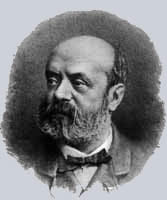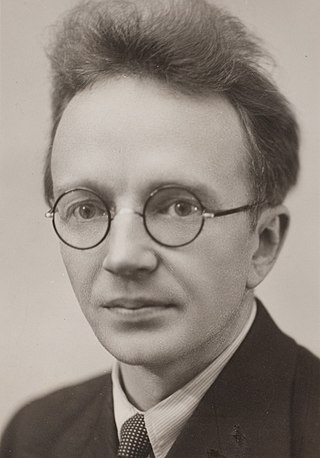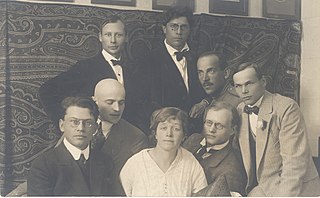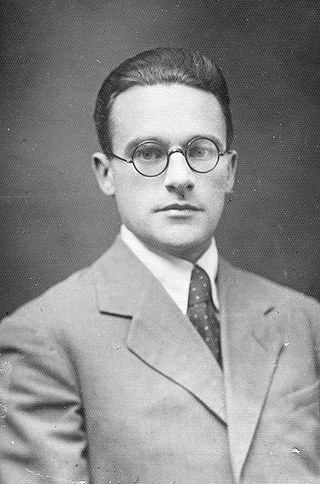
Théodore Aubanel was a Provençal poet. He was born in Avignon in a family of printers.

Stanisław Antoni Grochowiak, pen-name "Kain" was a Polish poet and dramatist. His is often classified as a representative of turpism, because of his interest in the physical, ugly and brutal, but he also exhibits strong tendencies toward formal, rhymed poetry, reaching on many occasions the ornamental grace of a baroque style. Grochowiak was born in Leszno and died, aged 42, in Warsaw.

Marie Under was an Estonian poet. She was nominated for the Nobel Prize in Literature in 14 separate years.

Richard Fedor Leopold Dehmel was a German poet and writer.

Jõgeva is a small town in Estonia with a population of around 5000 people. It is the capital of Jõgeva Parish and Jõgeva County.

Eugen Diederichs was a German publisher born in Löbitz, in the Prussian Province of Saxony.

Estonian literature is literature written in the Estonian language Estonia leads the world in book ownership, on average Estonians own 218 books per house, and 35% own 350 books or more.

Paul Viiding was an Estonian poet, author, and literary critic.

The Siuru literary movement, named after a fire-bird in Finnic mythology, was founded in 1917 in Estonia. It was an expressionistic and neo-romantic movement that ran counter to the Young Estonia formalist tradition.
Arbujad was the collective name for a loose group of eight Estonian poets, which represented a new direction in Estonian poetry before the outbreak of World War II.
Kersti Merilaas was an Estonian poet and translator. In addition, she wrote poems and prose for children and plays.

Heiti Talvik was an Estonian poet.
August Sang was an Estonian poet and literary translator. Sang was a member of the Arbujad literary group, which represented a new direction in Estonian poetry before the outbreak of World War II. He was known as a translator of poetry from German, Russian, French and Czech languages.

Van Nu en Straks was a Flemish literary and cultural magazine that was founded in 1893 by August Vermeylen. With a cover designed by Henry van de Velde, this magazine served as a vehicle for a Flemish literary revival and was associated with a heterogeneous group of writers and artists. They were devoted to art for art's sake, without holding dogmatic views on aesthetics or adherence to schools of art. The magazine was published in two series: from 1893–94 and from 1896–1901. It was succeeded in 1903 by the illustrated magazine Vlaanderen, which was co-founded by Herman Teirlinck.
Published in 1927, Les Arcanes is the second of Oskar Milosz's two cosmological poems, the first being Ars Magna (1924).

Piotr Choynowski was a Polish writer, novelist and translator; an elected member of the prestigious Polish Academy of Literature from 1933.

Hannes Pétursson is an Icelandic poet and writer who has authored a number of books of poetry and other works and received many awards. He is amongst the most widely translated of living Icelandic poets. He is a recipient of the German Henrik Steffens Prize in 1975 and the Icelandic Literary Prize for his poetry collection Eldhylur in 1993.

Anna Blaman, pseudonym of Johanna Petronella Vrugt, was a Dutch writer and poet. She was a recipient of the P. C. Hooft Award. The literary award Anna Blaman Prijs is named after her.
The Romantic Young Lady is a 1923 English language play adaptation from Gregorio Martinez Sierra's 1918 Sueño de Una Noche de Agosto, translated by Helen and Harley Granville-Barker. The comedy of manners, written in three acts, is set in Madrid. It features a romantic heroine, a sophisticated hero, and a thrice-married grandmother.

Helene Theodora Voigt-Diederichs was a German writer.
















